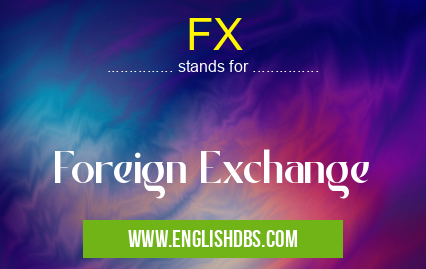What does FX mean in BANKING
FX is an abbreviation used to refer to the financial market of foreign exchanges, where a variety of different currencies from around the world are bought and sold. It is an acronym for Foreign Exchange. FX trading involves buying, selling or exchanging currency in order to make a profit on the fluctuating prices of different currencies across international markets. It is the largest and most liquid financial market in the world with more than $5 trillion changing hands every day.

FX meaning in Banking in Business
FX mostly used in an acronym Banking in Category Business that means Foreign Exchange
Shorthand: FX,
Full Form: Foreign Exchange
For more information of "Foreign Exchange", see the section below.
Essential Questions and Answers on Foreign Exchange in "BUSINESS»BANKING"
What is Foreign Exchange?
Foreign exchange, or 'Forex' for short, is the buying and selling of one currency against another in the open market. Forex trading can be conducted by large banks, financial institutions, and individual investors. The purpose is to make a profit from the fluctuating exchange rates between currencies.
How does Foreign Exchange work?
Foreign exchange works by exchanging one currency for another at an agreed-upon rate determined by the current market prices of each currency at any given time. This rate will fluctuate based on factors such as international economic news and speculation. Traders seek to buy low and sell high to make a profit.
What are the advantages of Forex Trading?
There are several advantages when trading forex compared to other markets. Firstly, one can take advantage of leverage which allows traders to trade much larger positions than the size of their own portfolios; Secondly, it's widely accessible with 24-hour hours trading opportunities which allow you to capitalize on movements in different markets around the world; Thirdly, there can be less volatility due to its inherent liquidity which reduces risk; Finally, there are no commissions or fees charged for investing in these markets unlike traditional stock investments.
What information do I need to start trading foreign exchange?
Before getting started with foreign exchange trading, it’s important that you have a good understanding of how currencies move and what factors affect these movements. It’s also important that you become familiar with different types of trading strategies such as momentum trading or swing trading so that you can identify which ones best fit your risk profile and overall goals. You'll also need access to a reliable Forex broker that offers competitive spreads and leverage options along with educational resources like tutorials and market analysis tools for successful decision making.
What risks come with Forex Trading?
As with any investment strategy, there are risks associated with foreign exchange trading due to its volatile nature and unpredictable trends in price movements of certain currencies compared to others over time. Therefore it's important you understand the risks involved before entering into this type of investments as your capital could be easily lost if not managed correctly. Some common risks include leverage risk, interest rate risk exposure, liquidity risk, event risk & political risk etcetera
How Much Money do I need to start Forex Trading?
The amount needed depends on both your goals prior experience in investments; however most retail brokers allow investors start with as little as $500 USD for opening an account. Although you don't need large amounts initially it's still recommended that you invest appropriately based on your own knowledge & expertise without exposing yourself too much risk while allowing yourself enough scope for substantial gains should everything go according plan.
Who regulates Foreign Exchange Markets?
The regulation of foreign exchange markets varies across countries depending on their respective regulatory authorities; however typically it falls under either banking supervision or securities regulation depending on the jurisdiction you reside within. Generally speaking all reputable FX Brokers should be registered regulated entities subjecting them legal requirements towards maintaining compliance enforced heavily by enforcement authorities worldwide.
Final Words:
In conclusion, FX stands for Foreign Exchange which is an acronym used within finance and banking circles for international money transfers involving two or more different types of currency. It represents both the services offered by involved institutions such as banks and brokers as well as transactions undertaken by private traders across global markets using sophisticated digital platforms. An understanding of financial fundamentals such as interest rate trends, political stability, inflation levels etc., are essential skills needed by those looking to get involved with FX trading in order to increase their chances of success when investing their capital into these potentially lucrative markets.
FX also stands for: |
|
| All stands for FX |
